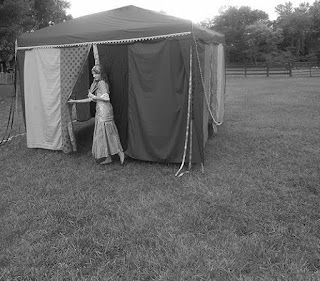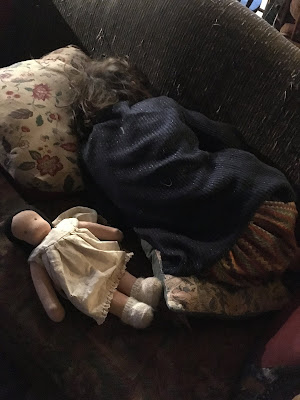Simplicity vs. Poverty
The third
mistaken identity of Lady Poverty is Simplicity, the simplicity of the Amish
housewife at her bread bin, of the nun scrubbing the cloister floor, the monk
baking bread. Simplicity dresses our childhood in unmuted hues: she decorates
the shrine of previous ages of history, whose complexities are worn away by
time. Simplicity is often confused with her counterfeit, Easiness, who flirts
with our spouses and friends, and who drops filters over every new plan or
possibility, opening hidden doors and carving out escape hatches. But true
Simplicity can be recognized by the hard work she requires, as the Amish, the
religious, our previous selves, and all our ancestors would loudly agree. She
is blind to trends and oblivious to fashion: simplicity is not a romantic.
Simplicity is the Benedictine serving tea to the wild-haired Franciscan bride,
shaking her head over the latter’s muddy bare feet and dramatic adventures.
Simplicity is fond of America and indulges our sentimentalism for it (she has
long ago given up on Europe). Even her admirers agree she has no ear for music,
a blurred eye for beauty, and is a little too indulgent with modern
architecture.
Allegory
aside, why do we yearn for simplicity frequently, recurrently? To be simple is
to be wholly one thing, all of one material or purpose. To be a unity, to live
as a unity.
Our world
is fragmenting fast, and we panic and yearn to return to simplicity. Simplicity
is our antidote, but it eludes us because we are not, by our lifestyle, simple.
So long as we live by our desires, we must be polytheists.
We are not
all one thing, not even those of us who are Christians. We all multitask,
juggle multiple personas and jobs, slicing our lives into thinner and thinner
compartments. We thread together contradictions and avoid conflicts of
interests, even our own interests. We maintain online or public personas which
contradict our private lives. Our lives are often sacks of sewn-together chaos.
Our
purpose is not unified. What is my purpose? I am a Christian, a woman, a wife,
a mother, a homemaker, an author, an editor, an artist. Can my life telescope
down into one unit: follower of Christ? What if it could?
And
simplicity is a servant, but not a goal. Any search for simplicity will be
futile until we decide what our way of life means. Civilization is more
convenient than chaos, but order is not equivalent to meaning. Who decides what
it all means? The technocrats? The
search engines? Democracy? The strong? The smart? The tribe?
Yet we
need simplicity, we need that one thing that we can center our lives
around. It needs to be real, not a mere
ideal, touching our lives at all the edges, shaping us and helping us shape
each other, nudge each other into shape, keep us touching reality. This one
thing is really One Man, and we need to build a way of life that allows Him to
touch us and shape us daily, hour by hour.
Christ did
not really talk about simplicity—but His followers did. Simplicity does not
mean having one sofa, two chairs, a coffee table with one book and one
decorative implement arranged on a sisal rug.
Simplicity means being all of one thing: it means being pure and whole. A simple heart is a heart that’s all about
one thing. I want, as Rich Mullins sang, to have Christ be that one thing: I
want a simple heart, not a divided one.
Trends and
fads are fun, but they are not a recipe for simplicity, nor for peace. I don’t
want to update my home: I want my home to be continually approaching one goal.
That’s how simplicity in the home works: it’s all oriented towards one goal,
despite the chaos and the cluttering.
Decluttering and ordering are not to achieve simplicity but to achieve
that goal.
So rather
than simplicity, poverty. If we must have worldly goods –and homemaking is
intrinsically connected to worldly goods—we need to order them and orient them
so that they do not rule us, they do not woo us, they do not betray us. Perhaps the best way to break their hold upon
our hearts is to detach from them altogether and seek poverty first.
Lord, show
me Poverty
Whom You loved so dearly…
Whom You loved so dearly…
What was
this poverty Francis ached for? Why did he see her as a lady, the loveliest of
ladies? Perhaps because he was an artist
and a poet and he saw what others could not: Lady Poverty is the only way to
beauty.
The artist
must empty herself to create. The soul must empty herself to become like
Christ.
Poverty
is, as I said, lack and want. It is the humiliation of not being able to buy
the meal you want, of having to return the too-expensive purchase you cannot
afford to keep. It is not enough. It is shame and ache and frayed nerves,
chewed fingernails, the agitated search, the hollow knowledge of nothingness,
the black-circled eyes, the averted face and lowered head, the broken safety
net, the cold shoulder, the hidden tears, the agony of want.
Each of us
has experienced personal poverty. It need not be material. The
having-nothingness. The naked surrender to hopelessness. The friend who doesn’t
call, the invitation never extended, the hug or kind word yearned for and never
received. We lack strength, energy, virtue, perseverance. We give up. We can’t.
We surrender to our own brokenness. We are not kind enough, strong enough,
patient enough, holy enough. Christ never quite breaks through our wooden
souls.
This is
poverty.
Seen this
way, who can have Christ without having poverty? It is impossible. Without that
internal daily emptying, Christ can never enter the packed closet of our inner
soul. The graces we receive lie like stacked gift boxes, unopened.
Poverty is
emptying that closet. Poverty is being the blind man who says, “Lord, I want to
see.” To not have poverty is to be a
Laodicean, claiming to be rich and well clothed, not seeing one’s wretched nakedness,
not only blind but lukewarm. I was a Christian for decades before I could say
with true sincerity, “What a wretched sinner I am.” Without poverty, our
conversion withers on the vine, and the beauty we might have manifested
withers.
So,
poverty must be interior. But the interior is not enough. Christ’s life, the
life-wrecking, earth-shattering ideals of Christianity shrivel into hypocrisies
if they remain abstractions.
There must
be an incarnation. Meat must be made of them, or they will fail. The kingdom of
heaven needs real doors, real windows, real soldiers and servants that come
among you.
Which is
why Francis was not content with poverty in spirit, as our uneasy pastors are
so hasty to assure us. He wanted poverty in body as well. So, he gave it all
away, save for one habit, to live with his Lady.
As a young
housewife, I beheld Francis’s radicalism in awe and perplexity. I am not an
acetic. I frankly love the body and all earthly pleasures and find them
congenial companions. I gloried in my bridal gifts and set about outfitting my
first household, a little attic apartment, with pride. I dreamed of
transforming it into a princess’s castle, with soft coverlets on the bed,
fetching outfits, carefully-contrived artwork, colorful pottery, and shining
glass windows. The Middle Ages represents for me my archetype, my gaze into
hidden beauty. But yet, there was Francis, beckoning.
Who was
this Lady Poverty? What was so beautiful about her that Francis, son of a
clothing merchant, certainly the best industry to be in if you loved beauty,
and in Italy! During the High Middle Ages! – could leave all the fashion and
pomp behind for her rags and nakedness.
I
hesitated, but I began to pray this prayer, which has never become rote and
which never fails to move me, a crie de couer.
I can find
no peace…
Merciful
Jesus, have pity …
You Lord
it was who first aroused love…
Please
grant….
I yearn….
I
earnestly pray…
For Jesus,
You were very poor…



Comments